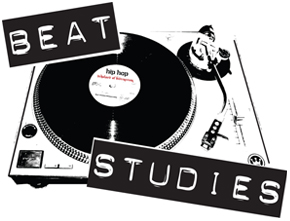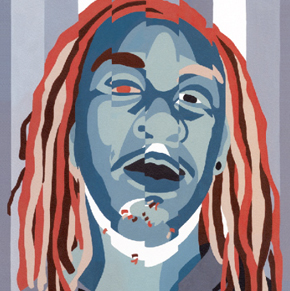Beat Studies Made Simple

In On the Road – Jack Kerouac’s defining work of the beat generation – the existential query, “What’s your road, man?” served as a siren song that lured thousands to answer the call of the open road, leaving the establishment behind in search of new meaning.
Beat Studies Productions – an Atlanta-based independent hip-hop label, like Kerouac, calls out the establishment (the hip-hop one) on its complacency when it comes to the commercialization of the genre. Beat Studies is paving a new road for a new generation of hip-hop artists who want to make what founder B.J. Alden calls “intelligent music.”
One of those artists is SIMP (a.k.a Duran Butler). For the record, SIMP is just about the freshest thing to sprout out of the South since, well, the Dogwood.
Here’s my enlightening Q&A with SIMP.

dp I know Beat Studies focuses on making “intelligent music.” What does that phrase mean to you?
SIMP It’s music with a purpose. It has a focus and a point to make. It stands on principals determined by the artist. A lot of music has lost its focus and meaning. Intelligent music means something.
dp What artists inspire you?
SIMP There are a lot to name. Anyone whose music that I actually bought has had an influence on me, but the names that come to mind are Nas, Common, 2pac, BIG, Lupe Fiasco, Kanye West, Talib Kweli, Curtis Mayfield, George Clinton, The Isley Brothers, Sade…my taste in music is all over the place.
dp Beyond music, what or whom else influences you?
SIMP My mother and father are my biggest influences. They are my blueprints to life. I learned how things are, how things could be, and how things should be by watching them.
dp How do you balance working for a living and making music?
SIMP Well…working keeps a roof over my head, food in my stomach and money in my pocket. Without those things I couldn’t make music. Music helps me keep my sanity while I’m at work; sometimes that’s where I do my best writing (laughing). The balance really just comes natural when it’s something you love. You tend to find the time.
dp Tell me a little about your Hip-Hop 101 project and how you came up with the concept.
SIMP Well it’s actually been an idea of mine since I was in high school. I always thought about how much better off I would be in the music business if someone had taken the time to sit and teach me about it. So, I came up with the idea to teach high school students how to start their own labels, manage and promote artist. The course also gives the artist an opportunity to learn their craft. They go through various activities to improve their vocabulary, stage presence, delivery, storytelling etcetera. Each label creates a demo for their artist, sets up photo shoots, and markets their material. It’s been a great experience for everybody to, as we say, “Learn what you love!”
dp Do you feel as if you’re teaching the kids – or are they teaching you?
SIMP It’s really a mixture of both. I think we learn a lot from their enthusiasm for what we are teaching them. They are so intrigued by the things that we think are common knowledge. It gives us insight on how far we have come and how much we still have to learn.
dp Do you think people are born with rhythm? Or is it something that is learned?
SIMP Wow…that’s an interesting question. I would say both. I think those who are born with it tend to gravitate to it and those who learn it don’t take much interest in it. I like to think I was born with it; music is my soul.
dp How do you shut it off? Meaning, I’m a writer, and the majority of the time I’ve got a story idea in my head – I think that’d be easier to tune out than say a beat or a sound. Is it a fight to get it out?
SIMP The best way to get it out is to create it. I write down lyrics on any piece of paper I can find and I keep it. Once it’s on paper, for me, it either develops right then and there or it turns into something later. I have a duffle bag full of rhymes that I’ve written since the 6th grade. I like to keep it because it reminds me of how far I’ve come. I prefer getting it out; that’s the only way for me.
dp What influence does the south and the Atlanta hip-hop community have on your music?
SIMP Growing up I was influenced by a lot of southern rappers from Outkast and Ludacris to Goodie Mobb and 36 Mafia. People tend to forget that Maryland is south of the Mason Dixon line. So, I’ve always had a love for the southern culture and music. My grandmother and great grandmother were raised around cornfields and farms; so was I for a period of time. So, I’ve always had a connection to, not just Atlanta, but the south and general. I’m half country boy (laughing)!
dp What do you hope your music says about you?
SIMP I hope it lets people know exactly who I am and what I stand for. I pride myself on being transparent. I want people to learn from my ups, my downs, my mistakes, and accomplishments. I want them to be inspired and moved in a way that they never thought hip-hop could move them.
dp How did you acquire the name SIMP? What does your stage name mean to you?
SIMP Well it originally came from the word simple, because that’s what everybody said about me growing up, they said I was just “so simple.” But, then I learned that it was slang for the opposite of a pimp or playa. So, when I thought about it I wanted to change it at first…but then I started to think why society has glorified being a pimp and a playa so much. I started to look at the male figures in my life and to me the pimp and playa role had never been a standard. I was raised to honor and respect women, so I thought it was kind of funny that if you weren’t a pimp you were looked at like a sissy or a sucka. Instead of running from the term and trying to combat it I decided to embrace it. Society has a funny way of discrediting the “stand-up” individual as soft or weak, so I hope to take that negative connotation and make it positive.
dp Was there an overall theme with the It’s that SIMPle! album you released last year?
SIMP Well…It’s that SIMPle! is really an ironic title because in simplicity can lie a lot of complex things, which I recently learned is a teaching of Taoism. But anyway, the title is meant to convey a certain level of irony because the album is anything but simple. The album as a whole is to give the audience a look into my life and everything in it. When you look at the cover the painting on it has my face broken down into sections and colors. This is a representation of all the layers of my life; adding to the irony, because each color and layer is simple in its own right, but when they come together it makes a complex body of work. In a nutshell the theme is “complex simplicity.”
dp As an artist, particularly a hip-hop artist dealing with beats, how much of what you do comes from collaboration with others?
SIMP All of it! That’s what makes the music so great; one persons idea can spark someone else’s. Then before you know it you have an amazing body of work, that neither you nor the other person thought was possible. Just by sharing ideas, styles, thoughts and experiences you can be inspired to go out of your own experience and tie-in things from places you didn’t know existed. Hip-hop is all about the relationship. For example, the phrase “Two Turntables and a Microphone,” that’s the relationship between the emcee and the DJ, so since the fundamental days collaboration has been a vital part of the music.
dp What’s next for you?
SIMP The World! I have a message and a gift that was given to me and I want everybody to hear it. I won’t stop until they do.
dp Where can I see you perform or buy your music?
SIMP Most of my performances have been in Atlanta at Apache, Red Light Café, Café 290 and Lenny’s, but I foresee a lot of branching out this year. You can find Digital Downloads of “It’s That SIMPle!” on iTunes, Amazonmp3.com, Napster, and Rhapsody. Hardcopies are at Criminal Records in Atlanta and they can be ordered via Beat Studies.








